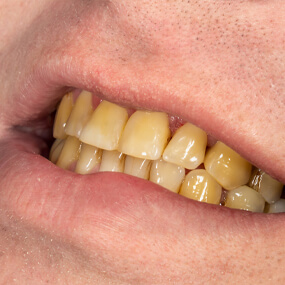Tooth Sensitivity: What Causes It and How to Treat It

Academy of General Dentistry statistics reveals that more than 40 million Americans have sensitive teeth. Enjoying coffee at breakfast or a scoop of ice cream after dinner causes them significant discomfort. It is so bad for many people that they would rather do without life’s simple pleasures than experience the pain. The good news is that tooth sensitivity is treatable and, in many cases, you can even do it at home.
Tooth Sensitivity: What Is It?
Teeth become sensitive when the underlying layer—the dentin—becomes exposed. This can happen because your gums recede or the protective layer—enamel—has worn away. The roots of your teeth have many channels leading to the pulp, which is where the nerves and blood vessels are. When exposed, these channels allow hotness, coldness, or sweetness to reach the nerve and cause pain.
Tooth Sensitivity: What Causes It?
There are numerous factors that can lead to sensitive teeth:
- Gum Disease and Tooth Decay—If your sensitive teeth hurt even at times when you are not eating or drinking, it can indicate early-stage tooth decay and/or gum disease. As plaque builds up, it can lead to cold-sensitive teeth prior to causing damage to the teeth and gums. If sensitivity is caused by receding gums, there are toothpastes that occlude exposed tubules in order to relieve pain.
- Over-Brushing and Brushing Too Hard—The American Dental Association recommends that you brush twice a day. You should avoid brushing more often. You should also use a soft-bristled brush and be gentle in order to avoid wearing down your enamel, which can expose your dentin.
- Using Abrasive Mouthwashes—So, if you only brush twice a day, what should you do after other meals? Rinse vigorously with water. You can also use a therapeutic mouthwash, but limit its use to about once a day. Avoid alcohol-based mouthwashes as well as products high in acids since they can further damage your teeth and gums.
- Consuming Acidic Foods and Drinks—Sugar gets a lot of attention when it comes to rotting your teeth, but acids can be even worse. Carbonated beverages and citrus fruit juices are great examples of drinks that are high in acids and can actually lead to your teeth being overly sensitive.
- Using Teeth Whitening Products—Over-the-counter teeth whitening systems and other products, such as toothpastes, are a leading cause of teeth sensitivity. If you are not using these products under advisement, discuss your sensitivity and the products you are using with your dentist.
- Stress and Bruxism—Bruxism is the technical name for teeth grinding, which can be exacerbated by stress. Teeth grinding wears away enamel and expose your dentin and nerves. If you may have bruxism, consult with your dentist, who can diagnose it and recommend treatment.
- Receding Gums—More than 80 percent of all teeth sensitivity begins at the gumline. Gums can recede due to periodontitis, but there are many other causes as well. Consult with your dentist. Your receding gums may be the symptom of a treatable condition, or your dentist may be able to recommend dental care products that occlude the exposed tubules and reduce discomfort.
- Imperfections in Your Teeth—Tiny imperfections in your teeth can form over time as your teeth contract and expand. These cracks can provide access to your nerve. Although often difficult to see with the naked eye, your dentist can identify and treat them.
- Exposed Nerves—Although teeth sensitivity takes many different forms, the fundamental cause is stimulus reaching the tooth pulp. The dentinal tubules in your teeth are filled with liquid. When the tubule becomes exposed to cold, for instance, that fluid is agitated and triggers a pain response.
Tooth Sensitivity: How to Reduce It?
Managing sensitive teeth is usually rather simple:
- Good Oral Hygiene—Brush, floss, and rinse on a regular basis. Thorough oral hygiene helps avoid the tooth decay and gum disease that are common causes of sensitive teeth.
- Be Gentle—There is no need to scrub your teeth. A gentle brushing motion is more than enough, and choosing a soft-bristled brush avoids any unnecessary wear to your teeth and gums.
- Opt for a Desensitizing Toothpaste—There are ADA-accepted toothpastes on the market that desensitize while also containing fluoride and other agents you want for a healthy mouth. Discuss your choice with your dentist, who may offer you personalized recommendations.
- Use Fluoridated Dental Products—Fluoridated toothpaste is a must. Many therapeutic rinses also contain fluoride, which can help to strengthen teeth and avoid teeth sensitivity.
- Adjust Your Diet—High consumption of acidic foods can lead to and exacerbate sensitive teeth. Unnecessary acids, such as from soft drinks, should be avoided. Acids from healthy foods should be enjoyed in moderation, and you should take care of your teeth after all meals. You can rinse with water as well as snack on foods like milk and cheese that neutralize acids.
- Take Bruxism Seriously—Grinding your teeth can lead to a host of health problems in addition to teeth sensitivity. Discuss it with your dentist. A custom-fit mouthguard may be the solution.
- Visit Your Dentist—Even if your teeth and gums feel great and look great, schedule a visit with your dentist every six months. You will receive a professional cleaning and fluoride treatment. Your dentist will then examine your teeth and provide personalized oral hygiene recommendations.
Tooth Sensitivity: When to See a Dentist?
If you are visiting your dentist regularly, then in many cases, you can discuss it with him or her during your next visit. However, if discomfort from cold or heat is persistent over the course of several days, you should schedule an appointment as soon as possible. It may be just basic sensitivity, but it could also be an indication of tooth decay or even an abscess. Prompt treatment is crucial in either case and in severe cases, your dentist may recommend root canal therapy in order to save the tooth and relieve pain.
Some people simply have sensitive teeth and may develop them as they age. In these cases, your dentist can recommend both in-office treatments and at-home care options. In-office treatments include the application of desensitizing agents and/or protective coatings for your teeth. Over-the-counter or take-home products are often similar to in-office desensitizing agents but with a lower concentration.
Relieve Your Sensitive Teeth
If you are experiencing sensitive teeth, there are options available that can cure or at least manage the condition. Jeffrey D. Clark, DDS, is among the most respected dentists in the region, and he has substantial training and experience in helping patients deal with their uniquely sensitive teeth. If your teeth are sensitive, we recommend that you schedule an appointment with Scottsdale Cosmetic Dentistry Excellence as soon as possible. Reach us today at 480 585 1853.




